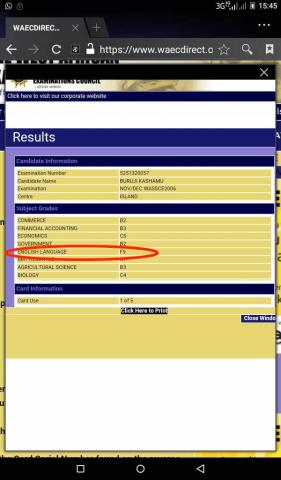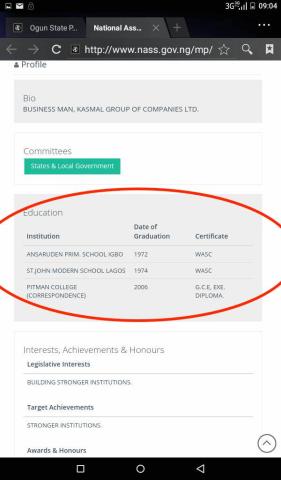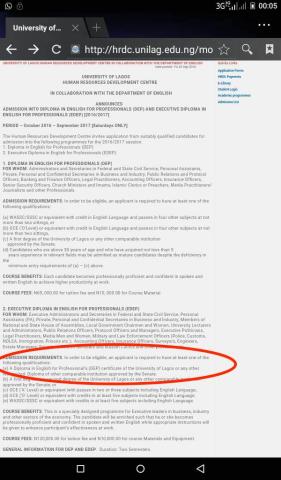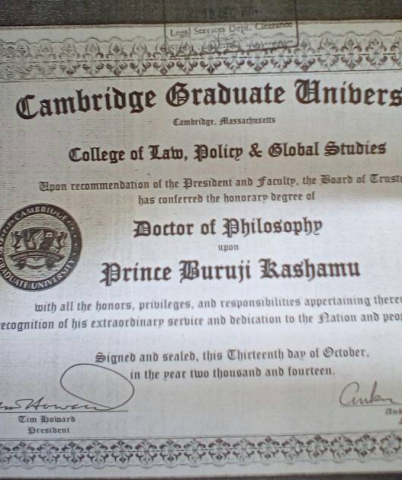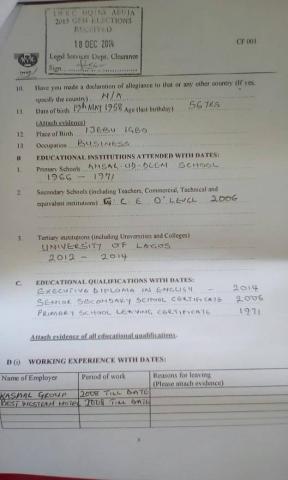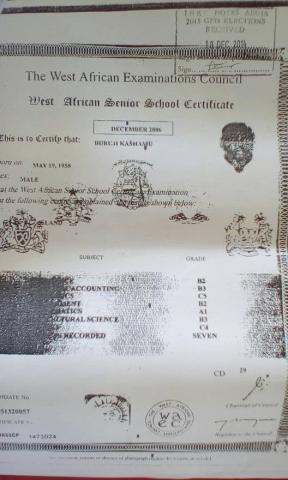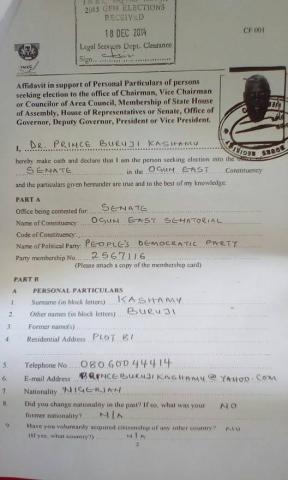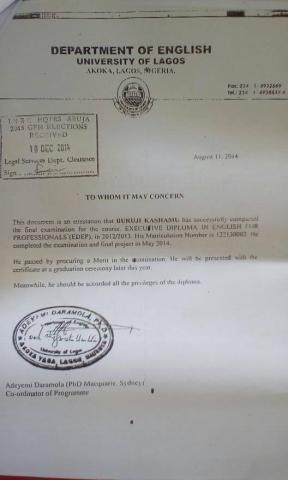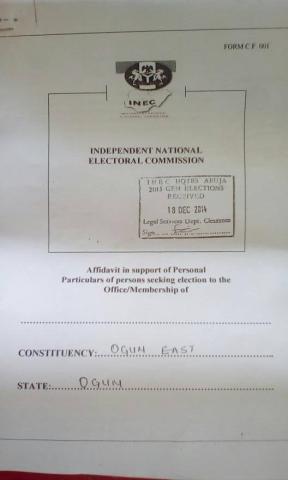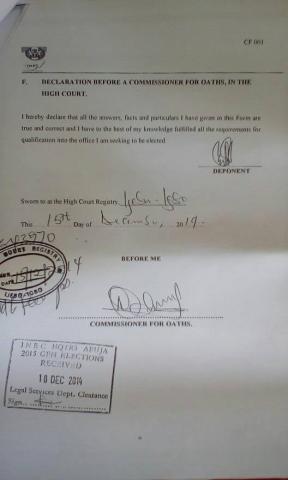
Mr.Buruji Kashamu, the drug lord wanted in the United States for heroin trafficking and Senator representing Ogun East Senatorial District, used forged educational qualifications to contest and win election to the Nigerian Senate in 2015 according to Saharareporters investigations.
Mr.Kashamu, known in the social circles as "Eso Jinadu," remains the subject of extradition proceedings in the United States. A range of evidence unearthed through SaharaReporters investigations showed that Mr. Kashamu cooked a series of academic qualifications to mask his sparse education background to con the Independent Electoral Commission (INEC) to accept he was qualified to run.
In the affidavit in support of personal details, deposed to before the Commissioner of Oaths at the Ogun State High Court Registry, Ijebu-Igbo on December 15 2014 and received by INEC three days later, Mr. Kashamu claimed to possess General Certificate of Education (GCE), obtained in 2006; and an Executive Diploma in English for Professionals (EDEP), obtained from the University of Lagos Department of English in 2014.
In the completed INEC CF 001 forms and sworn affidavit, exclusively obtained by SaharaReporters, Mr. Kashamu claimed to have earned seven credits including English Language by tactically blurred the subject section apparently in collusion with INEC officials. His examination number, as shown by the result he claimed to have obtained from the West African Examination Council (WAEC), was 5251320057.
As proof of his cooked Executive Diploma in English, the wanted heroin baron, manufactured a letter, which he claimed was signed by Mr. Adeyemi Daramola, Coordinator of the University of Lagos EDEP program. The letter, which bears August 11, 2014, states that Mr. Kashamu participated in the program in the 2012/2013 academic session and completed his "final project" in May 2014.
It lists his Matriculation Number as 12213002.
"He passed by procuring a Merit in the examination. He will be presented with his certificate at a graduation ceremony later this year. Meanwhile, he should be accorded all the privileges of the diploma," the confected letter states. However, admission requirements into the program obtained by SaharaReporters from the Human Resources Development Centre of the University of Lagos include the possession of a credit pass in the English Language.
However, a WAEC modulated examination result obtained by Saharareporters shows that Mr. Kashamu scored F9 in English Language even though he was reportedly in writing the exams by a paid mercenary. This implies that there was no legally valid way he could have qualified for admission into the program let alone receive certification.
It also offers an uncomplicated indication that Mr. Kashamu lied under oath, an offense punishable under Section 118 of Nigeria's Criminal Code, and which carries a penalty of 14 years in prison. Efforts to obtain the reaction of the alleged program coordinator, Mr. Daramola, proved abortive.
The politician's dishonest claims are not limited to the University of Lagos. For example, on n his sponsored Wikipedia page, Mr. Kashamu claimed to have attended Igbobi College, Lagos. But on his official National Assembly page, he claimed to have undergone a correspondence course at Pitman College. The location of the college and the course underwent are conspicuous by their absence.
The desperation to come off as garlanded also pushed him to claim that he was awarded an honorary PhD by "Cambridge Graduate University's College of Law, Policy, and Global Studies."
The institution has the dodgy reputation of being a fraudulent degree mill and has been the subject of multiple investigations in the United States. It was famously described by a former watchdog of Degree Authorization, Alan Contreras, as "crude ill-constructed and poorly
conceived pursuit of raw money".
In January, the United States Seventh Circuit Court of Appeal seated in Chicago upheld the extradition request of the US Drug Enforcement Administration to bring Mr. Kashamu to the US to stand trial for his role in 1998 heroin case which was later adapted into a television series titled 'Orange Is The New Black'.
For long, Mr. Kashamu had been well known on the Lagos party circuit, where Fuji musicians sang his praises and those of other dodgy characters, notably fraudsters and drug barons. He was known as "Eso Jinadu." He disappeared from view to returning home from the United Kingdom in 2003, where he managed to wriggle free of a US extradition order. He initially stayed off the radar. But apparently persuaded that going into politics could get the monkey of the extradition off his back, he joined the then ruling Peoples Democratic Party (PDP), where he set up what he called "Omo Ilu Foundation."
Funded with money made from drugs, the foundation provided copious cash, rice, and even taxis as inducements for prospective voters in Ijebu Igbo, his hometown, to join the PDP.
He was feted by the then governor of Ogun State, Mr. Gbenga Daniel, who appointed him a member of the Governing Council of Tai Solarin College of Education. His influence grew, especially with the money from the illicit drug trade and his willingness to spend without restraint. In between, he caught the attention of former President Olusegun Obasanjo, whose relationship with Mr Daniel had soured over the fact that each wanted a different person to be governor of Ogun State at the expiration of Daniel's term.
Mr. Kashamu teamed up with Obasanjo to the understandable chagrin of Mr. Daniel, spending, according to him, $20million to support the former President in his battle against Mr. Daniel.
The feud re-invited public attention to Mr. Kashamu, who was at the time posing as having made money from producing Kamsal, a cigarette brand, in the Republic of Benin. He was arrested in the United Kingdom with $230,000 in cash. Mr. Kashamu claimed that his 1998 indictment by a grand jury in the Northern District of Illinois for conspiracy to import and distribute heroin in the US was a case of mistaken identity. He claimed that the person involved in the alleged offenses, to which a dozen people pleaded guilty, was his deceased younger brother, who resembled him closely.
Among those who pleaded guilty was US citizen, Piper Kerman, whose prison memoir was adapted for Orange Is The New Black.
Mr. Kashamu maintained that the UK court saw that the US had withheld evidence that a principal conspirator in the said drug importation had been unable to identify him in a photo lineup.
It was on that basis that the UK court refused a request from the US for his extradition in 2003 and freed him after five years in jail.
Last year, Judge Richard Posner of the Chicago Court of Appeal 7th Circuit quoted the US Justice Department as saying that the prospects of Mr. Kashamu's extradition had improved. It added that if it is proved that Kashamu was the ringleader of the heroin cartel, he could face up to life should he end up in jail for and challenged him to come to Chicago to prove his innocence in court.
Criminal politics and raw cash have both delivered what Mr. Kashamu wanted it for: political protection. Under the administration of former President Goodluck Jonathan, he became a big hitter in the PDP and eventually made the leader of the party in the South-West, a development that infuriated Mr. Obasanjo. The former president famously complained in his letter to Mr. Jonathan that he could not inhabit the same political party with a felon.
He followed it up by savaging Mr. Kashamu in his memoirs. Obasanjo quit the PDP. Mr. Kashamu approached a court, unsuccessfully, to prevent the release of Mr. Obasanjo's memoirs. He consequently sued for libel but later withdrew the case.
Though he remains a PDP member, he never criticizes the current administration of President Muhammadu Buhari. In fact, he openly supports the administration in his bid the keep the Federal Government on his side.
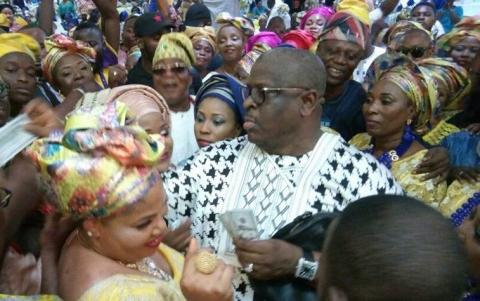
He is also enjoying the support of the current Senate, which is widely considered as a bonafide collection of degenerates.
